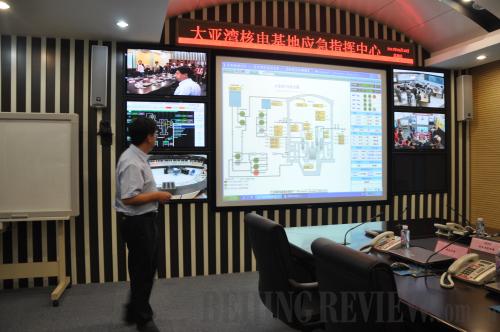|
 |
|
STAYING ALERT: A staff member at Dayawan introduces how the power plant's emergency center works (CHEN BAOLONG) |
CGN has established a nuclear and radiation information platform, said Tan. When an event above INES level 0 occurs, the platform will publish the information within two working days or 72 hours during holidays.
The public can check the website of the Dayawan Nuclear Power Operation and Management Co. about the operation, safety, radiation protection and environmental monitoring of the plant, said Hu Guangyao, spokesman of the CGN, which operates the Dayawan plant. "For those events below INES level 0, we'll also put them on our websites for the public to check."
"As long as the public knows what's going on, they won't panic," said Hu.
CGN's Ningde and Hongyanhe plants set up the same information platform on April 15 and June 7, respectively, said Hu. All CGN's nuclear power plants under construction will follow the practice.
"Information disclosure has been included into our inner supervisory and control system, which is very strict," said Li Jing, director of safety and information department of CGN. Any malfunctions or errors should be recorded faithfully. Anyone who hides the information, whether a manager or a technician, will be severely punished, said Li.
Raising public awareness
The Fukushima nuclear accident has exacerbated people's worries about nuclear safety. But China, the world's largest energy consumer, must continue developing nuclear power. A clean form of energy, though, nuclear power only contributes a meager 1.7 percent to the country's electricity consumption, according to the CAEA.
People fear nuclear power mainly because they don't know enough about it, said Chai Guohan, chief engineer at the MEP's Nuclear and Radiation Safety Center.
Nuclear power is safe and clean and emits little greenhouse gas. The amount of radiation of a nuclear power plant is much less than a coal-fired plant, said Pan Ziqiang, a veteran expert of nuclear radiation protection and currently Chairman of the Committee of Science and Technology at the CNNC.
To demystify nuclear power, "we often invite the public to visit our power plants in an effort to disseminate knowledge about nuclear power," said CGN Vice General Manager Tan. In the past two years, CGN's power plants received nearly 10,000 visitors. CGN has also held more than 60 lectures on nuclear power and nuclear safety. The company also uses microblogs to further communicate with the public.
Once a nuclear accident occurs, the biggest impact won't be physical but mental, said Liu from the China Institute of Atomic Energy.
"Increasing nuclear knowledge among the public and communicating more with them is beneficial to the healthy development of the nuclear energy industry."
Email us at: yushujun@bjreview.com | 